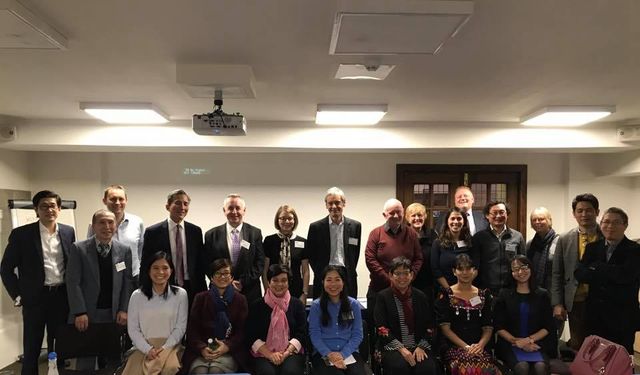15th January 2019, 13:00-17:00 HR, Friends House, Euston, London
This MUKHA Diaspora Engagement meeting, jointly hosted by HEE and THET, was held for the second time to provide an opportunity of networking and updating the progress of MUKHA in Myanmar to a wider group of UK stakeholders engaged in health in Myanmar together with Burmese diaspora.
This meeting aimed to:
- Improve the understanding of five priority areas among diaspora
- Inform MUKHA members the existence of five thematic working groups
- Provide the updated progress of work in each thematic working group
- Empower the diaspora community to lead/contribute on this work
- Provide ample opportunities for networking
- Identify barriers and opportunities
- Share next steps
Sessions
Welcome by Professor Ged Byrne, Health Education England, Ex-Co-chair of Myanmar UK Health Alliance welcomed and encouraged the diaspora to come up with one action plan in relevant specialty area to be implemented in 2019. Followed by (1) Dr. Thinn Thinn Hlaing (THET Myanmar Country Director) for MUKHA Overview; (2) Dr. Helen Crawley (Professor David Tolley) for Medical Education Thematic Working Group Presentation; (3) Dr. Sonny Aung (RCGP) for General Practitioners Thematic Working Group Presentation; (4) Dr. Ian Halsall for Laboratory services Thematic Working Group Presentation; and (5) Professor Judith Ellis for Nursing Thematic Working Group Presentation.
And then, Health Digital Information Thematic Working Group Presentation was given by Dr. Thinn Thinn Hlaing.
Three webinars have been held for Health digital information system development thematic working group. From these discussions, the current situation of the health information system development can be divided into different working groups as below:
- Health Information System:
- DHIS2 (digital health information system): developed in partnership with University of Oslo and implemented in 33 townships
- Hospital information system : not in digital format but aggregated data and implemented in 600/1134 hospitals – JAPHIEGO and Global Fund
- Open Master Patient Index (MPI) for multidrug resistant TB, malaria and HIV patients – UNICEF and Mohow University
- Health Man Power Registry system: Daw Aye Aye Sein
- Logistic Management system: Logistic Information Management System (LIMS) – supported by UNFPA
- Population Services International (PSI) are preparing to develop Electronic Identification Code (EID) but will not be ready until 2021
The priority areas identified by the working group are:
- To standardise the data collection and interoperability across different systems
- To develop Electronic medical record system for hospitals
- To develop the Health facility registry
- To develop the national identification number
Group Work
After the presentations, the attendees split into 5 groups, representing the 5 thematic working groups. They were tasked with discussing and listing suggested priorities for their assigned thematic working group in light of 4 key considerations; (1) workforce development, (2) funding sources, (3) opportunities and (4) challenges.
They were then asked to do the same for diaspora. The considerations were:
- Alignment with thematic groups
- Ways of working
- Communication between diaspora, thematic groups, partnerships
Finally, they were asked to reflect on what this meant for both the thematic working groups, and the diaspora going forward.
Evaluation
The attendees rated the various sessions highly, with average scores between 4.14 and 4.61 out of 5. The introductory and group-work sessions scored particularly highly for usefulness. The attendees generally felt that the sessions were the right length.
Of the possible things that attendees gained from the day, the most evident were: strengthened connections, a new understanding of the work being delivered in Myanmar, and improved knowledge of the priorities, opportunities or challenges therein. Relatively few attendees thought that the event offered practical advice. A handful of attendees offered that they felt that the content and purpose of the sessions could be improved or better articulated.
A number of attendees commented that for future events, stronger representation from Myanmar Government would be appreciated. It would allow more focused discussions on how best the diaspora could contribute efficiently and appropriately.
